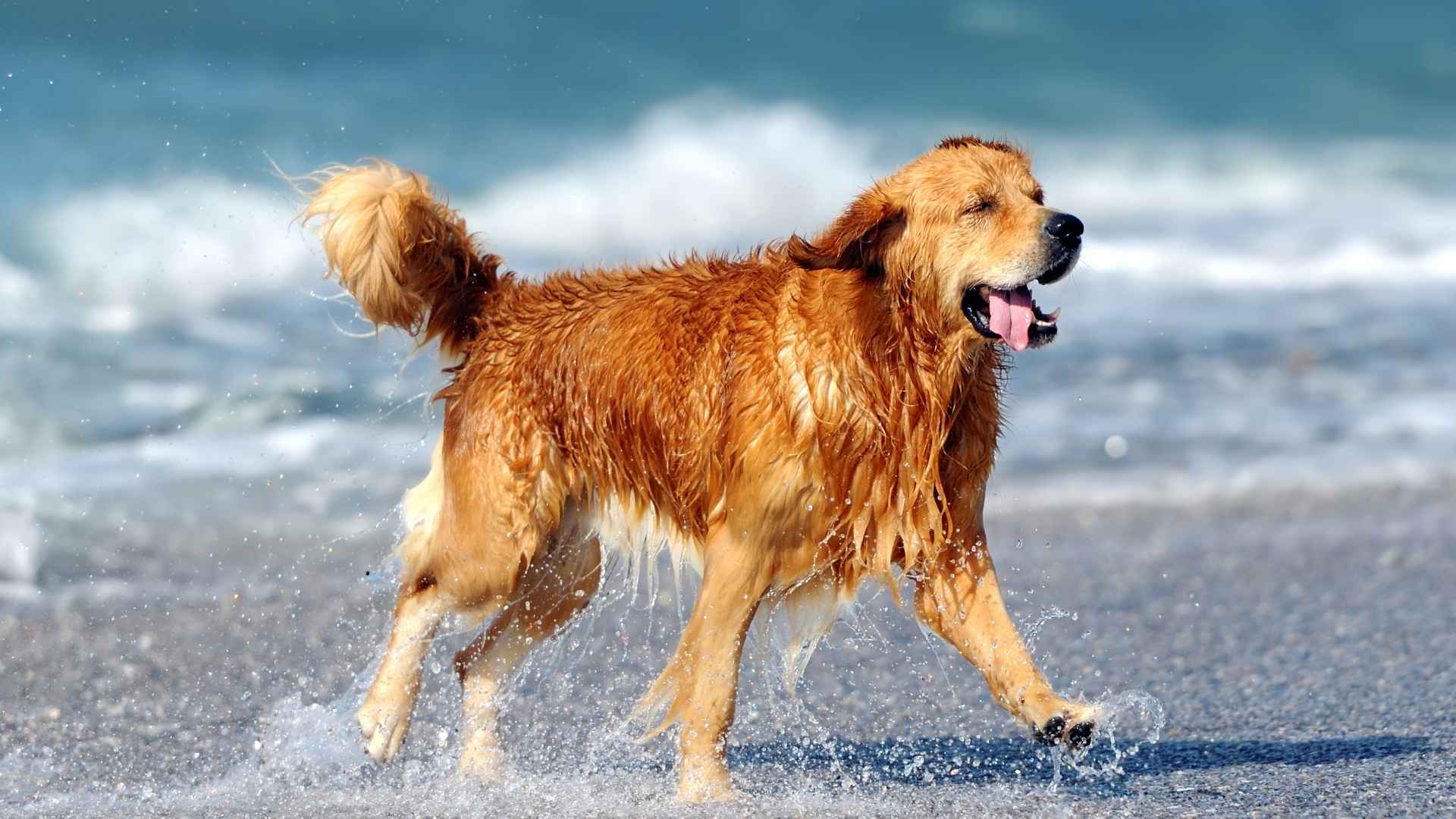Some people go to the beach to tan. Others go to think. But if you’ve ever gone with a dog who’s into it, you know the day just hits different. The second you unclip the leash, they take off. No plan. Just pure joy.
They dig, run, and sniff everything. You can see it in their body—they’re happy. Not all dogs are like that, though. Some don’t like the water. Others don’t like getting dirty. And that’s okay.
But if the beach is your happy place, it makes sense to find a dog who feels the same. You don’t want to drag them along. You want them to pull you there.
In this article, we’ll go over the dog breeds that actually love beach walks. The ones who were made for the sand, the wind, and all the chaos that comes with it. These dogs just get it.
Dog Breeds That Love Beach Walks
1. Golden Retriever
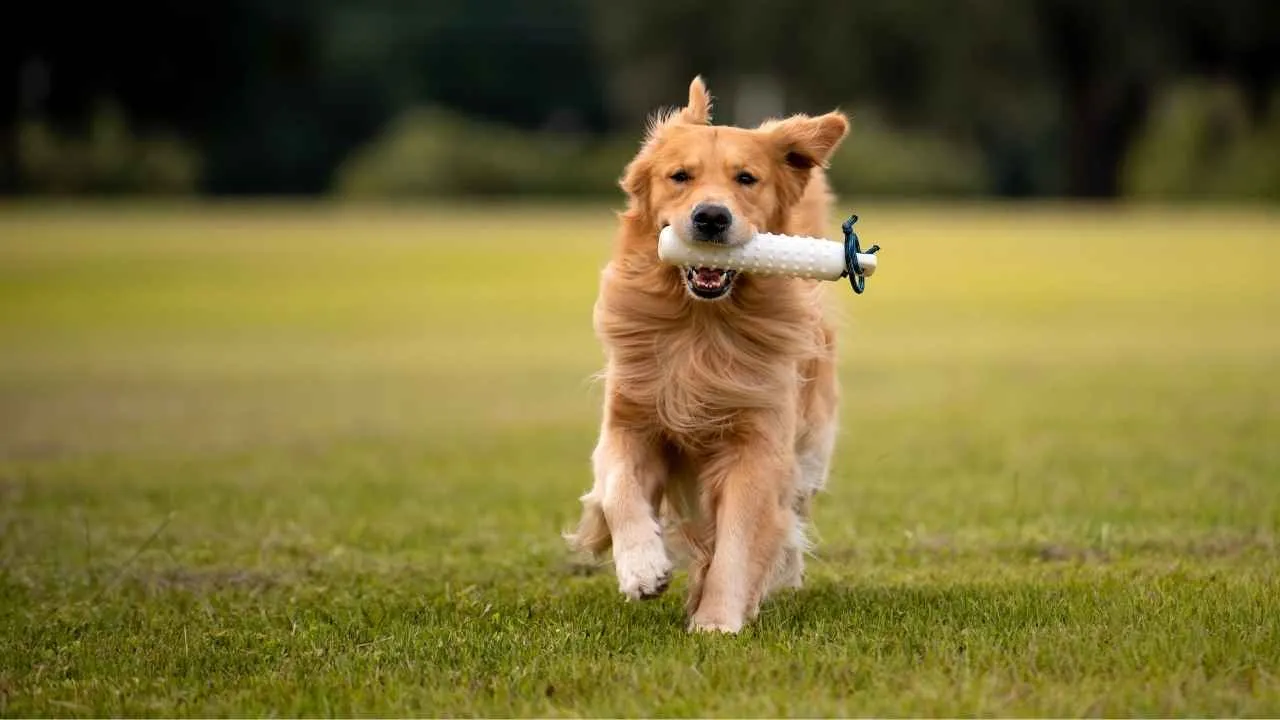
Golden Retrievers were originally bred to retrieve waterfowl, which explains their comfort and eagerness around shorelines. Their muscular frame and webbed feet make long walks on wet sand or shallow waves feel effortless. They don’t hesitate—they dive in, splash, and stay active for hours.
Consistent Social Composure
This breed carries a calm demeanor even in crowded, noisy beach environments. They handle passing joggers, playing kids, and other dogs with practiced ease, never overreacting or withdrawing. That reliable sociability makes them ideal for relaxed coastal outings.

Focused Recall Even Off-Leash
One reason Golden Retrievers remain popular beach companions is their responsiveness, even in wide, open settings. These intelligent dogs are known for checking back with their handler without constant commands. That ability to self-regulate makes the experience more enjoyable for both.
A Famous Habit That Matches the Setting
Goldens are famously known for carrying items in their mouths—sometimes even towels or flip-flops if left unattended. At the beach, this behavior takes on a playful charm as they proudly parade toys or sticks from the waves. It’s instinct, not mischief, and always earns a few smiles.
2. Border Collie
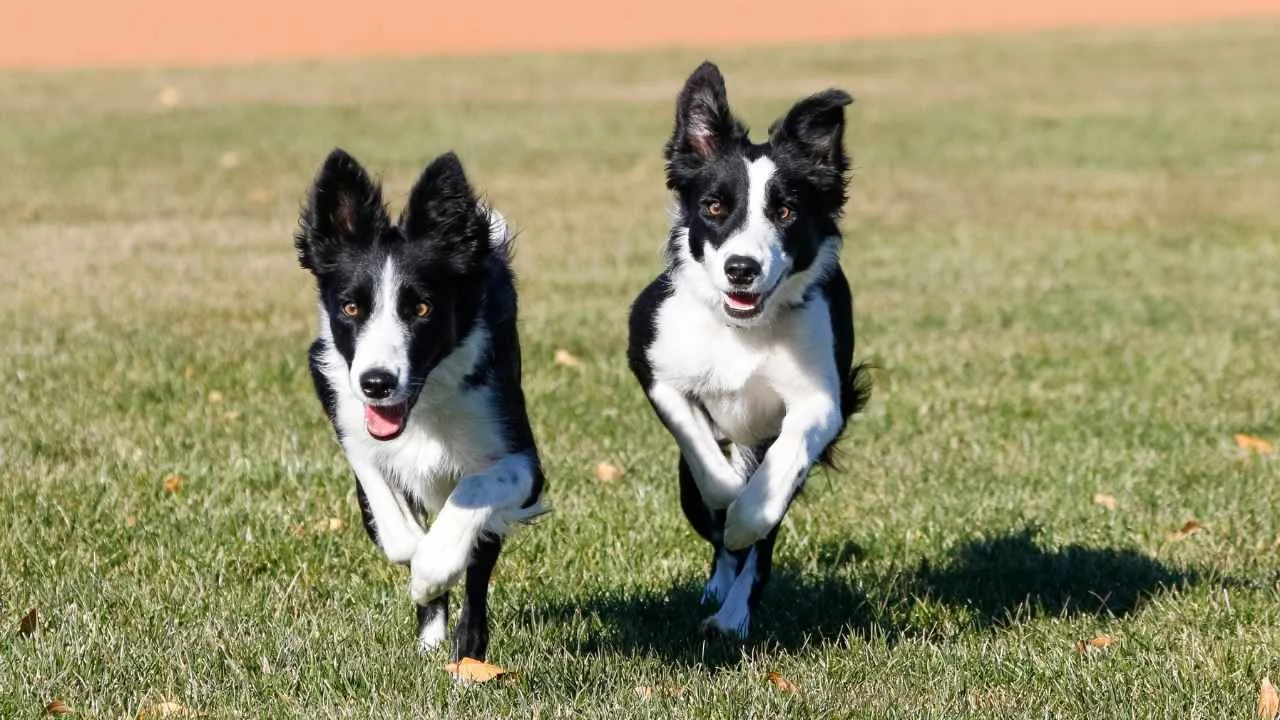
Border Collies don’t treat the beach as a place to wander—they see it as a problem to decode. They observe wave patterns, track moving birds, and often try to “herd” foam or seaweed with sharp focus. This mental stimulation turns a simple walk into a task that they stay engaged with.
Responsiveness to Shifting Conditions
Windy coastlines, shifting sand, and changing tides don’t unsettle them—they adapt in real time. These dogs adjust their gait, posture, and pace based on environmental feedback. It’s part of their sharp breed characteristics, refined through decades of precision work on open terrain.
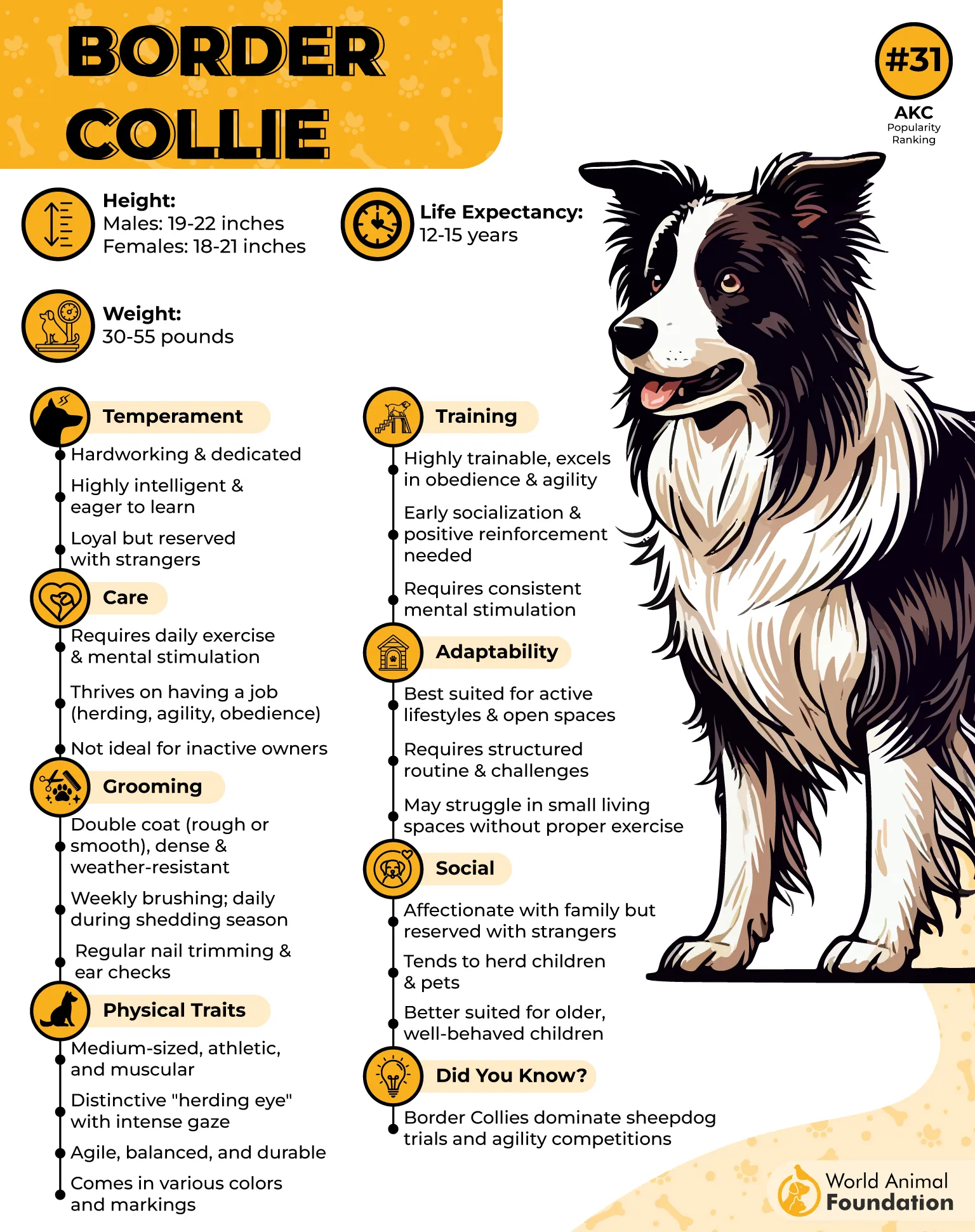
Physical Output That Matches the Setting
The high energy level of Border Collies pairs perfectly with expansive beach areas. They sprint, turn sharply, and chase tossed discs for extended periods without slowing down. The open space lets them fully burn their energy in a healthy, productive way.
Known for Recognizing Hundreds of Words
A Border Collie named Chaser was documented in Science Direct to understand over 1,000 words, a feat unmatched in the canine world. This cognitive ability supports off-leash walking with minimal verbal commands. It makes beach outings feel fluid, even in distracting environments.
3. Portuguese Water Dog
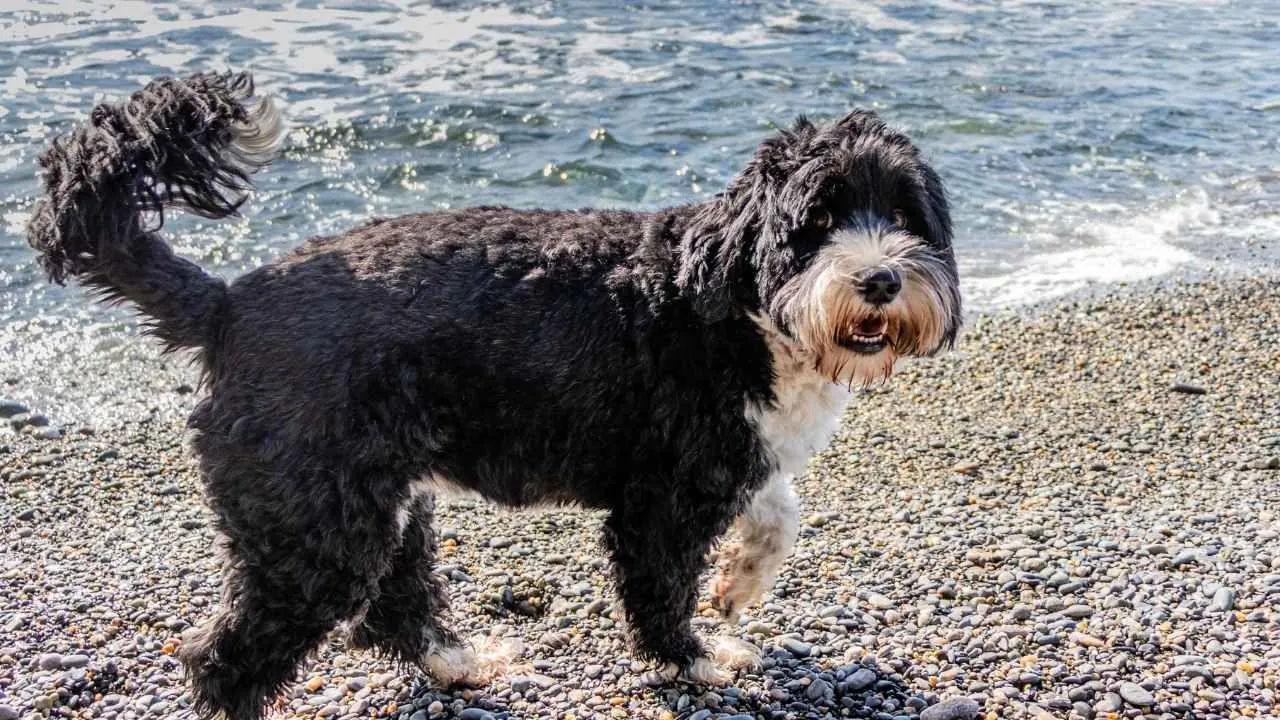
The Portuguese Water Dog was originally bred to assist fishermen—retrieving gear, herding fish into nets, and swimming between boats. That work shaped their stamina and instinctive ease in saltwater. Their energy finds a perfect outlet in long, wet, sandy strolls.
Smart Movement in Shifting Sand
Their compact, athletic frame and strong hindquarters give them excellent traction on soft surfaces. They can maneuver seaweed patches, rockier stretches, and sudden puddles without hesitation. That kind of agility makes the beach terrain feel like a home base.
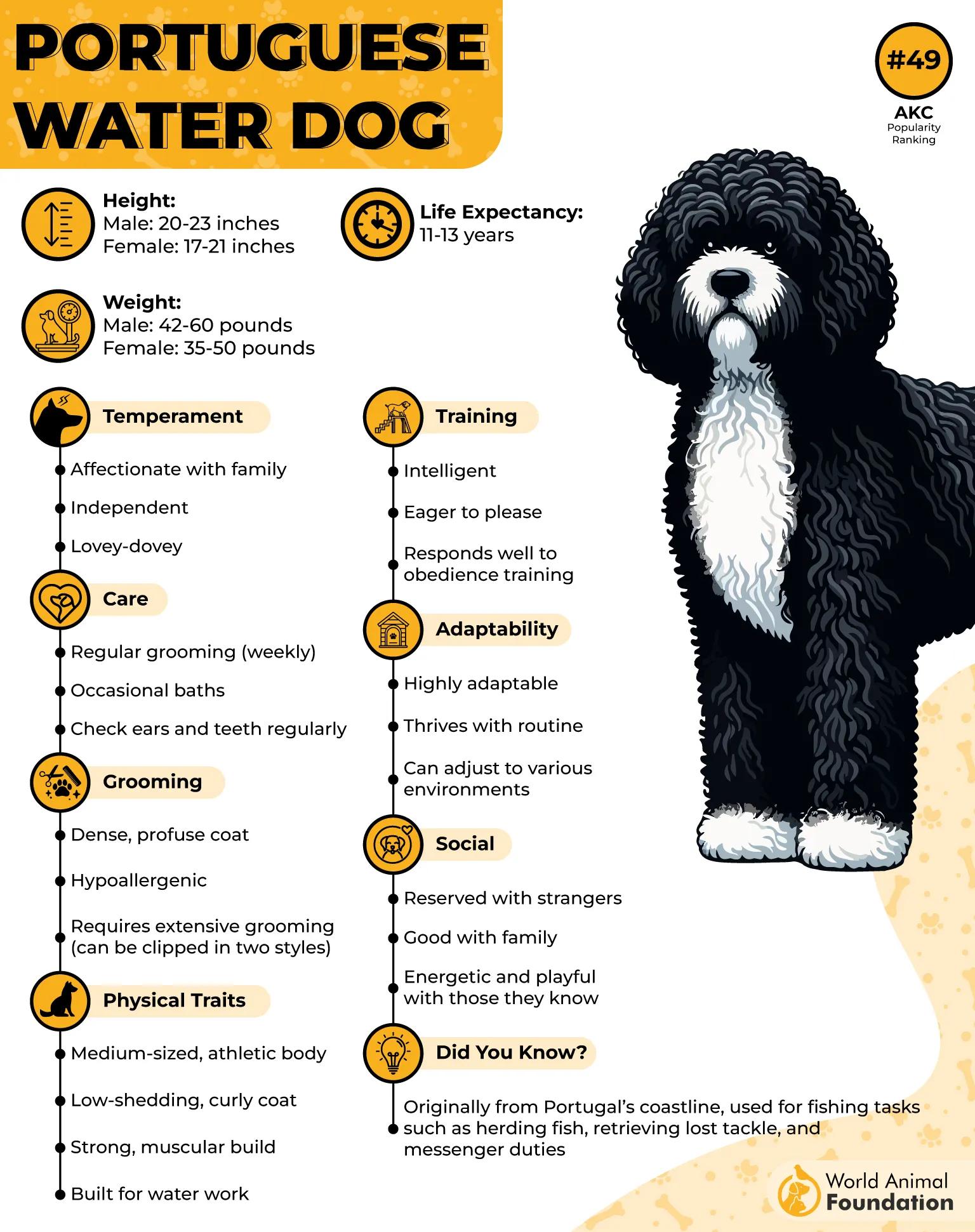
Waterproof Protection by Design
Their dense, curly, water-resistant coat keeps them insulated and quick-drying even after repeated dips in the surf. It also shields their skin from sand irritation, which is especially helpful on windy days. Owners rarely worry about post-walk skin discomfort or chill.
A Quirk That Makes Them Stand Out
One fascinating fact: these dogs were once trained to carry messages between boats and shore by swimming across the surf with waterproof pouches. That history still echoes today—they’ll often search for something to retrieve, even on casual beach visits.
4. Irish Water Spaniel
The Irish Water Spaniel has a tight, water-repellent double coat and a unique “rat tail” that minimizes drag while swimming, as per Purina. These traits weren’t cosmetic—they were designed for serious water retrieving tasks in cold climates. Their webbed feet enhance balance on slick rocks and wet sand.
High-Energy Pacing Matches Shoreline Stretches
This breed thrives in open environments where it can sustain a steady trot for extended periods. Long beach walks align perfectly with its need for regular, engaging physical exercise. It’s not about speed but duration—covering ground with purpose and ease.
Focused but Quirky Demeanor
While some dogs love chaotic play, the Irish Water Spaniel prefers directed activity with brief, sudden bursts of goofiness. They’re known to “clown around” after structured tasks—a breed quirk that often appears after fetching or patrolling the shore. It’s controlled energy with a spontaneous twist.
A Rare Breed with Strong Drive
One of the lesser-known sporting breeds, the Irish Water Spaniel often flies under the radar at beaches despite being well-suited for them. Its temperament pairs well with an active lifestyle, especially for handlers who enjoy both structure and play. You won’t see most dogs tracking the waves with this level of drive.
5. Poodle

The iconic Poodle haircut began as a practical choice to help them move through water more efficiently. Areas like the chest and joints were left covered to protect from cold, while the rest was trimmed to reduce drag. This history aligns them closely with water-rich activities like beach walks.
High Energy, Low Stress Outdoors
Poodles release energy best through movement that involves variety—tide pools, shifting sand, gentle waves. They stay mentally alert in new surroundings, often tracking patterns in water or footprints. This attention to environmental detail keeps them engaged throughout long walks.
Natural Fit for Active Owners
For pet parents who enjoy an upbeat pace, Poodles adapt smoothly without overstimulation. Whether Standard, Miniature, or Toy, they mirror their handler’s rhythm and don’t lag or dash unpredictably. Their balance of agility and control makes them surprisingly dependable in open, sandy spaces.
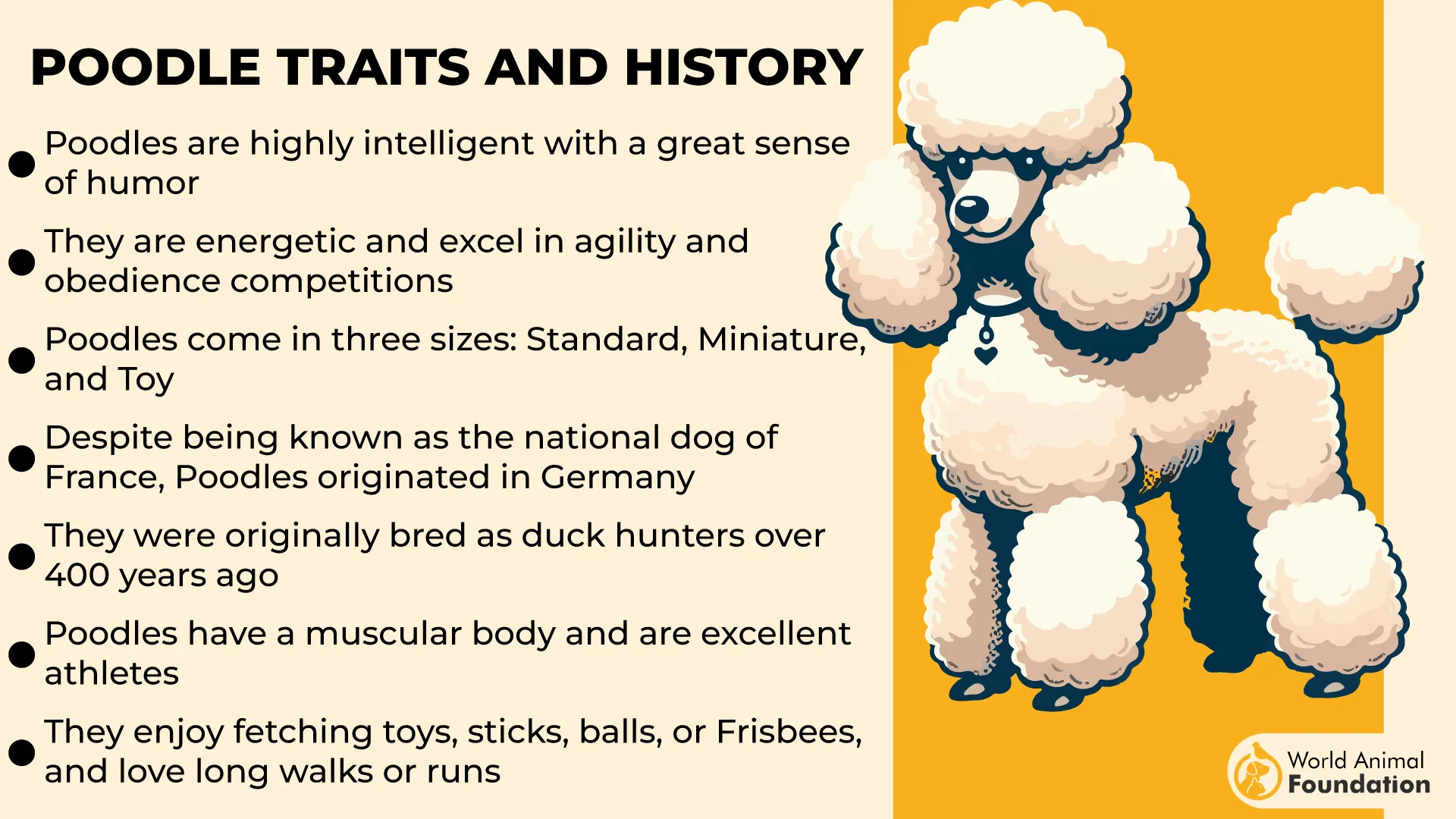
Enjoyment With a Task
Poodles often carry small objects from the shore to the towel without needing to be told. This stems from their retrieving background and desire to participate in shared activity. That eagerness to assist adds a layer of connection, making them an ideal canine companion during beach routines.
6. Labrador Retriever
Labradors have a double coat that naturally repels water and insulates their body, making them comfortable even after hours along the shoreline. Their strong hindquarters provide lasting stamina over shifting sand. This balance of structure and energy allows for extended, low-effort walks in beach settings.
Tail-Driven Steering in Water
Their thick, otter-like tail acts as a rudder when they swim. This feature gives Labs exceptional balance when transitioning between land and shallow surf, allowing them to move smoothly in and out of the waves. It’s a built-in tool, not just a trait.
Calm Focus in Distracting Spaces
They respond well to voice and hand cues, even in high-stimulation areas like a busy beach. While distractions like seagulls and watercraft might rattle other breeds, Labs tend to stay tuned in to their handler. This trait is a result of decades of work-specific breeding and consistency.
A Presidential Favorite for Water Activities
Bill Clinton’s Lab, Buddy, was known for his love of open spaces and water play, as the NY Times mentioned. Labradors have long had a reputation for excelling in outdoor family settings. Their behavior matches their build: friendly but capable, playful but not chaotic. That mix makes beach walks a natural fit.
7. Jack Russell Terrier
Jack Russells excel in open spaces where their energy doesn’t hit a wall—quite literally. Beaches give them the perfect running ground with soft resistance that fuels their natural agility. The shifting terrain doesn’t slow them down; it challenges them in ways they seem to enjoy.
Keen Response to Coastal Sounds
This breed reacts instantly to new sounds, from seagulls overhead to waves crashing nearby. It’s not nervousness—it’s alertness rooted in their history as fox hunters. Even in a casual beach walk, their ears are working almost as much as their legs.
Naturally Drawn to Movement
Moving water, flying frisbees, darting birds—Jack Russells track all of it with laser focus. Their beach behavior tends to be more investigative than playful, constantly scanning the environment. This instinct to pursue motion means they stay highly engaged throughout.
A Quirky, Beach-Perfect Habit
Jack Russells have a known obsession with digging, and sand gives them an outlet that doesn’t involve tearing up anyone’s backyard. At the beach, this turns into enthusiastic digging fits in shallow pits, sometimes for no reason but pure joy. It’s comical, but also completely on-brand for the breed.
Conclusion
The beach isn’t for every dog, but for the right ones, it’s magic. They run, they roll, they chase waves like it’s a game. Whether you’re looking at small dogs or bigger ones with thick double coats, the joy is the same.
Some breeds have traits that make them perfect for beach life, like partially webbed paws or a famously curly coat that dries fast. Others have a background that fits, like helping fishermen or being bred to hunt waterfowl.
The American Kennel Club lists many of them as top choices for active families, and it’s easy to see why. They’re great at playing fetch, love open space, and respond well to positive reinforcement. These wonderful dogs aren’t just pets—they’re wonderful companions.
If the beach is your place, and you’ve got boundless energy too, these might be the best dogs for your lifestyle—even off the sand, out on hiking trails.


